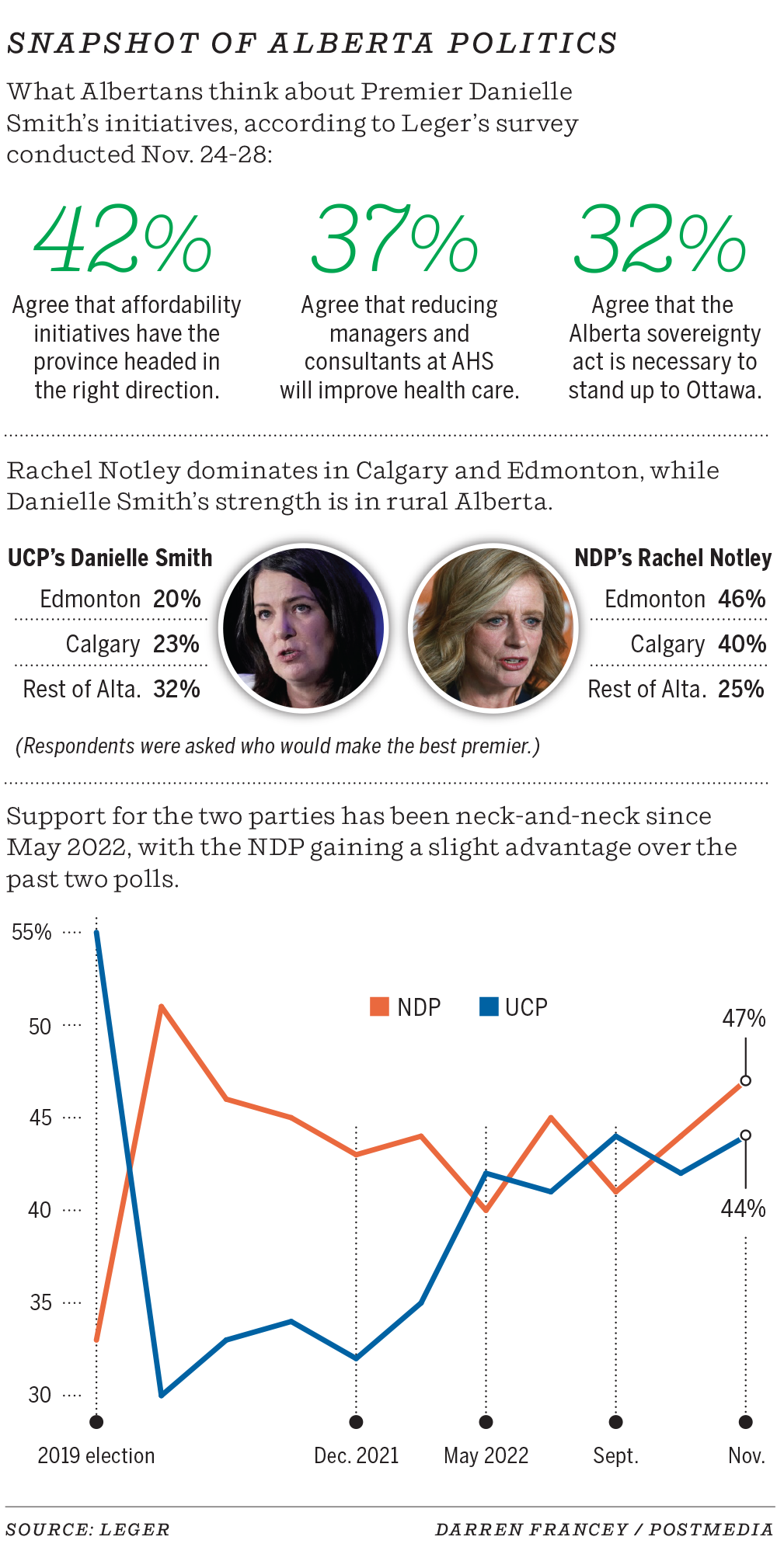Alberta’s Sovereignty Act has a weakness that could see it defeated in court

Article content
Many Albertans are always willing to give a new premier a chance. Heaven knows, they’ve had plenty of practice.
Advertisement 2
Article content
The VKP is benefiting from a bump to victory in a new Leger Research poll which shows the government trailing the NDP by just three points in vote intention.
Article content
Opposition Leader Rachel Notley’s party has 47 percent support, while the CCP stands at 44 percent, well within the margin of error.
But the UCP momentum comes with some alarm bells.
Among decided voters, Notley has a big lead in Calgary, the crucial battleground in the next election.
The NDP is at 51 percent, the VKP 41 percent. If these numbers hold through the election next May 29, the UCP will lose.
The other problem is Smith’s own performance rating. Only 25 percent of respondents say she would make the best prime minister. Thirty-seven percent say that about Notley.
The Army poll was conducted from 24 to 28 November. Smith’s Sovereignty Act was introduced the next day. Subsequent polls will provide a solution to its impact.
Advertisement 3
Article content

The law is highly controversial because it would give Alberta the power to retaliate against Ottawa even if future federal action is deemed harmful. It orders every public entity in the province to obey orders from the cabinet.
That’s breathtaking enough for one bill. But serious criticism also focuses on the use of a “Henry VIII clause” (an archaic provision that comes with or without beheadings).
It gives Smith’s cabinet the power to amend or write laws without legislative debate or approval.
The prime minister claims that the cabinet could only impose something that had already been approved by the house.
But Bill 1 doesn’t quite say it. It allows the cabinet to “suspend or modify the application or operation of all or part of a law . . . (and) specify or set out provisions which apply in addition to, or instead of, any provisions of a provision of law.”
Advertisement 4
Article content
This alarms U of C emeritus law professor Nigel Bankes.
“What Bill 1 does is to authorize the cabinet to issue directives relating to any law whatsoever,” he says.
“There must be a limit to this Henry VIII clause.”
Only last year the UCP government agreed. In a Supreme Court case, the province vehemently opposed the use of the clause in a federal greenhouse gas pricing bill.
-

‘A gimmick’: MP Chahal rejects sovereignty bill, calls on province to work on issues of the day
-

Braid: Smith’s Sovereignty Action troops are uneasy about following her into battle
-

Varcoe: Canadian chamber warns ‘business could be caught in the middle’ of fallout from sovereignty laws
Alberta l
awyers argued: “This provision, known as a ‘Henry VIII clause,’ is inherently at odds with the established notion of parliamentary democracy and insults the rule of law.”
Advertisement 5
Article content
The Supreme Court approved the bill in a complex ruling.
But Bankes says the Henry VIII clause had a very narrow application in that case.
The sovereignty law use of the provision, he says, “has breadth that extends far beyond what was authorized in the Supreme Court greenhouse gas reference.” He believes the bill can be successfully contested.
In the Supreme Court ruling, Justice Suzanne Coté wrote: “Henry VIII clauses empower the executive to act arbitrarily by allowing it to act contrary to the enabling statute, and create an authority without meaningful limits .”
She said the core function of enacting, amending and repealing laws must be “protected” from the executive.
Many people are wondering how Prime Minister Justin Trudeau might respond to the sovereignty bill.
Will he fight it politically? Using the federal power of disapproval?
More likely, perhaps, is that he will just walk it to the Supreme Court.
Don Braid’s column appears regularly in the Herald.
Twitter: @DonBraid
